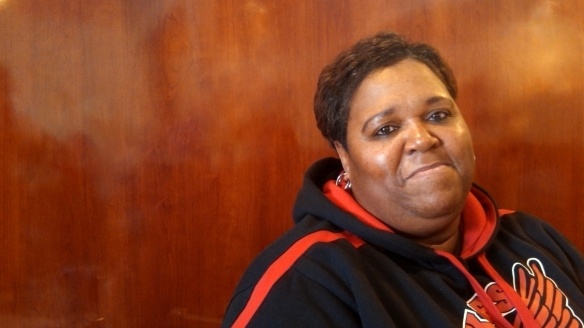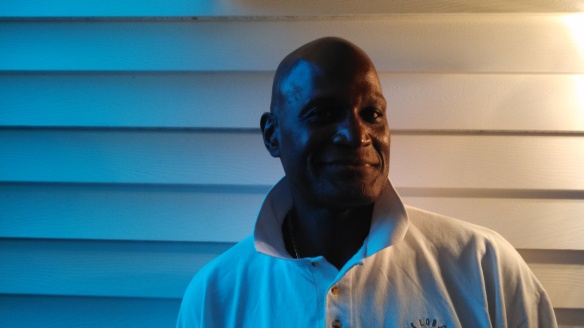
Age: Over 70
From: North Philadelphia
First pool experience: Penrose (12th and Susquehanna), at age 7 or 8 – sometime in the 1940s
Work with the pools: In over 50 years, “I’ve worked at so many – there’s not too many pools in this city that I haven’t worked in.” First position was as a lifeguard at Rice (now closed, it was at 32nd and Ridge) at 16 or 17. Spent 20 years at Gathers (25th and Diamond, a pool he describes as “my sweetheart”), helped to desegregate Sacks (4th and Washington), and served as a Water Safety and Lifeguard Instructor at indoor pools still with us (Sayre and Pickett) and departed (Rhodes). Now a Pool Equipment Operator at Martin Luther King (22nd and Cecil B. Moore).
Favorite pool: “Any pool that got water.”
—
A conversation with Snake Faison is a surround-sound experience. There are audio effects. Suspenseful pauses. A voice that should play as a demonstration when you look up the word sonorous.
In the moment that someone else might yell to a child, “Stop running!” Snake spits out rapid-fire, “Hey, hey, hey, you getting ready to hit the street? You know I don’t be having that! You don’t know how to act, get out. Now go down there and swim, or go around 29th Street where the track field is!”
Then he turns to adults nearby to explain, “I talk with an authoritative tone, and they get the message.”
Ask him what it takes to be a great City of Philadelphia lifeguard, and he lowers his voice, leans in and whispers, “You really wanna know?”
Then Snake leans back, lifts his head to the sky and sings at full volume, “Patience. Plenty of paaaaatience.”
About his job now, he’ll tell you, “The sun sucks up chlorine like you’re pulling soda through a straw.” And, “When I came back around here and seen [co-worker] Chuckie, my heart did boom-boom-boom-bap, boom boom. Son of a bitch!” Stamping feet like a drumroll, “Aay, aye, dee, I’m here!”
—
His family started calling him Snake when he was five or six, because it fit for a kid who liked to crawl on the floor and wiggle around. One of 10 brothers, Snake attended Paul Lawrence Dunbar Elementary, where he was captain of the swim team; now-closed FitzSimons, where he won city aquatics championships; and Edison High School, where he played ball, ran track, did a little boxing – and, always, swam.
“I loved that water,” he says. “Water – like that, it just did something to me. I don’t want to sound vulgar – it was almost like I was having an orgasm or something. Bang! I. Just. Had. To. Get. In. That. Damn. Water. And you couldn’t stop me! I would jump the fence at night. And the night watchman – which is one of the positions I hold right now – me and him got tight. He would let me swim. “
Snake’s family moved to Strawberry Mansion, and he started with the Department of Recreation as a lifeguard at Rice at 32nd and Ridge. Snake got shot in that pool, by another City employee, a high hurdle champ and student at Roman Catholic, now a doctor, named Malcolm Boykin.
“One Saturday, he brought in a starter pistol. And he was showing it to me. And it accidentally went off and hit me in the chest. Wow. My father never sued the City, ’cause he was a City employee. But I think a memorandum – I think it’s still there – was written up: As long as I have my lifesaving certificates, I’d be hired by the Department of Recreation as a lifeguard.
“They deemed me a troubleshooter. I would go to pools, years ago, like here, when the first door opened – chaotic, diving – I could come in and clean it up in a day. I did 20 years with the Board of Education as a disciplinarian, so you know I can spy trouble when I blink an eye. I can smell it, when something’s brewing.”
By way of example, Snake tells a story of South Philly’s Sacks. “The Blacks ran it during the day, and the whites ran it at night. I don’t know if you’re familiar with 4th and Washington. The projects are across the street, tall buildings. That’s where the gangs and the Blacks were. On the other side, going South, that was the white guys’ side. So in the daytime, the Black guys ran the pool. Up to about five-thirty, six o’clock. Then when I had night swim from seven to nine, the white guys ran it. Throughout the years that passed, the pool got segregated. Somebody had to put their foot down.
“So I started, you know, ‘Look, you wanna go swimming?’
“‘Yeah!’
“‘Well, why don’t you go swim by the Blacks over there?’
“‘Well, they’ll jump you!’
“‘No they won’t.’
“So one started – one white guy started, young bull, started one night. The next night it was four, then it got to twelve, then it was equal. And my policy: If you fight in here, you’re taking money out of my wife’s pocket. And I’ll split your fucking head, easy. Look. Y’all got to understand one thing. This is a equal opportunity facility. If you want to swim, you can swim in here. Only person to put you out is me and God. And that’s my right-hand man.
“Being in a public atmosphere and learning to intermingle is good for the soul.”
—
Snake may be the only human being who has swum in more Philadelphia public pools than I have. “I damn near been to them all,” he says. “New ones, old ones. North Philly, Frankford, Germantown, West Philly, Southwest. I’ve swum in pools that ain’t even here no more. Before your time! You ever swam at 32nd and Ridge? No.”
He was around for night swims, for deep ends and diving tanks, when all the pools were surrounded by the sort of brick walls that give O’Connor, Cohox and Kendrick their tucked-away feel.
“What would Philly be without its swimming pools?” I ask Snake.
“Ahh! Pandemaenium! Chuckie Mills,” he pulls in the legendary boxing trainer, who is also his fellow PEO, “Here’s a question for YOU. Shoot it to him, baby.”
“What do you think Philly would be without its swimming pools?” I ask Chuckie.
“It’d be like a desert,” Chuckie says.
“I like that one,” says Snake. “Dry land.”
“Right now,” Chuckie continues, “The kids, they can be free-spirited; they can relax; they can identify with theirself – you know, that little precious time, for the few weeks of summer. And you know, they could be somewhere getting in trouble.”
“Mmmhmm, mmhmm,” Snake agrees.
“Water relaxes you,” Chuckie says. “You be around water, and it relaxes you. You know, every time we have a crisis, like with the President or something, they say: ‘Why’s he fishing, when he should be here or there.’ And you know, he’s thinking. He’s near water.”
“Water makes you relax,” Snake says.
“It help you think,” says Chuckie.
“I’m over 70 and I’m having the best time of my damn life, right now. Sitting with my homie. And if you didn’t know it, we argue like husband and wife,” Snake laughs a deep belly laugh and stamps his feet.
“See, this is the kind of camaraderie that builds my spirit. Keeps me more… focused. Instead of being like that brick wall. Hard core. NO! No. I had brainwashed myself. I thought I used to be like that. And then my wife said, ‘You know, you walk around like you an iron man, but when you come home you’re just as meek as a damn granny pussycat.’
“Some of the people that I worked with throughout the years, it’s like when you see ’em, and you ain’t seen ’em in a while, that harmony look like it never left. Like when I came back around here and seen Chuckie, my heart did boom-boom-boom-bap, boom boom. Son of a bitch! Aay, aye, dee, I’m here! You know, things like that make you feel good.”








